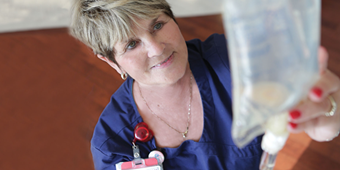Dense Breast Tissue: Your Right to Know
.jpg?Status=Master&sfvrsn=842d94ff_0)
Answer a few questions and we'll provide you with a list of primary care providers that best fit your needs.
Are you one of the many Ohio women to learn that you have dense breasts? If so, you may be wondering exactly what that means.
If your mammogram shows that you have dense breast tissue, Ohio law requires your mammography provider to notify you. The law took effect in March 2015, making Ohio the 20th state to enact such a bill. Notification is important, because dense breast tissue is a risk factor for cancer and can make it more difficult to clearly identify breast cancer on a mammogram.
Having dense breast tissue isn’t uncommon or abnormal. It refers to the amount of fibrous tissue versus fatty tissue in the breast. The more fibrous tissue your breast has, the more dense it is, according to the American Cancer Society (ACS). It doesn’t reflect the size or firmness of your breast.
Why It’s Important to Know
The ACS notes that women with a lot of dense breast tissue have up to six times higher risk of getting breast cancer than women with very little dense breast tissue. Dense breast tissue makes it harder for physicians to detect cancer on a mammogram because it looks white, and breast masses or tumors also look white. So, the dense tissue can hide tumors.
Breast density is measured and assigned to one of four levels. Women with the two highest levels of breast densities must be notified so they can discuss the issue with their doctor. If you have dense breast tissue, your written mammogram report will include this notice:
Having dense breast tissue isn’t uncommon or abnormal. It refers to the amount of fibrous tissue versus fatty tissue in the breast.
“Your mammogram demonstrates that you have dense breast tissue, which could hide abnormalities. Dense breast tissue, in and of itself, is a relatively common condition. Therefore, this information is not provided to cause undue concern; rather it is to raise your awareness and promote discussion with your health care provider regarding the presence of dense breast tissue in addition to other risk factors.”
.jpg?Status=Master&sfvrsn=584a7080_0)
If you have dense breast tissue but no other major breast cancer risks, you’re considered at moderate risk of getting breast cancer, according to the ACS. You typically won’t require additional imaging tests, such as ultrasound or magnetic resonance imaging (MRI) to further examine your breasts. These tests can be helpful in finding breast cancer in women with additional risk factors, but they also raise false alarms by finding things that aren’t cancer.
Talk to your doctor about whether you have other risk factors for breast cancer — and any next steps you need to take to prevent or detect breast cancer early.
Answer a few questions and we'll provide you with a list of primary care providers that best fit your needs.
Source: “Ohio Enacts Breast Density Inform Law,” Imaging Technology News, 1/12/15; breastcancer.org; American Cancer Society




